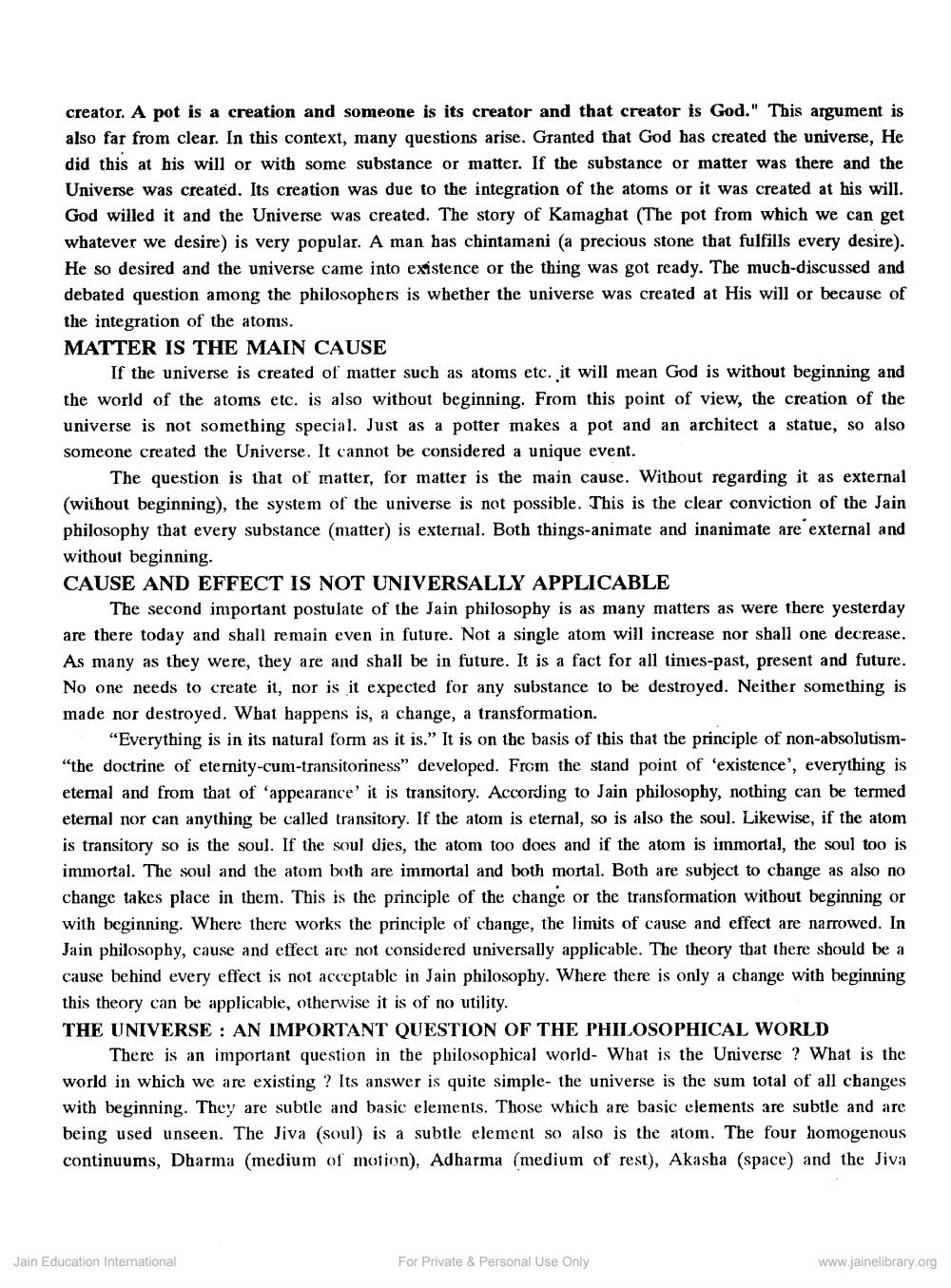________________
creator. A pot is a creation and someone is its creator and that creator is God." This argument is also far from clear. In this context, many questions arise. Granted that God has created the universe, He did this at his will or with some substance or matter. If the substance or matter was there and the Universe was created. Its creation was due to the integration of the atoms or it was created at his will. God willed it and the Universe was created. The story of Kamaghat (The pot from which we can get whatever we desire) is very popular. A man has chintamani (a precious stone that fulfills every desire). He so desired and the universe came into existence or the thing was got ready. The much-discussed and debated question among the philosophers is whether the universe was created at His will or because of the integration of the atoms. MATTER IS THE MAIN CAUSE
If the universe is created of matter such as atoms etc. it will mean God is without beginning and the world of the atoms etc. is also without beginning. From this point of view, the creation of the universe is not something special. Just as a potter makes a pot and an architect a statue, so also someone created the Universe. It cannot be considered a unique event.
The question is that of matter, for matter is the main cause. Without regarding it as external (without beginning), the system of the universe is not possible. This is the clear conviction of the Jain philosophy that every substance (matter) is external. Both things-animate and inanimate are external and without beginning.
CAUSE AND EFFECT IS NOT UNIVERSALLY APPLICABLE
The second important postulate of the Jain philosophy is as many matters as were there yesterday are there today and shall remain even in future. Not a single atom will increase nor shall one decrease. As many as they were, they are and shall be in future. It is a fact for all times-past, present and future. No one needs to create it, nor is it expected for any substance to be destroyed. Neither something is made nor destroyed. What happens is, a change, a transformation.
"Everything is in its natural form as it is." It is on the basis of this that the principle of non-absolutism"the doctrine of eternity-cum-transitoriness" developed. From the stand point of 'existence', everything is eternal and from that of 'appearance' it is transitory. According to Jain philosophy, nothing can be termed eternal nor can anything be called transitory. If the atom is eternal, so is also the soul. Likewise, if the atom is transitory so is the soul. If the soul dies, the atom too does and if the atom is immortal, the soul too is immortal. The soul and the atom both are immortal and both mortal. Both are subject to change as also no change takes place in them. This is the principle of the change or the transformation without beginning or with beginning. Where there works the principle of change, the limits of cause and effect are narrowed. In Jain philosophy, cause and effect are not considered universally applicable. The theory that there should be a cause behind every effect is not acceptable in Jain philosophy. Where there is only a change with beginning this theory can be applicable, otherwise it is of no utility.
THE UNIVERSE: AN IMPORTANT QUESTION OF THE PHILOSOPHICAL WORLD
There is an important question in the philosophical world- What is the Universe? What is the world in which we are existing ? Its answer is quite simple- the universe is the sum total of all changes with beginning. They are subtle and basic elements. Those which are basic elements are subtle and are being used unseen. The Jiva (soul) is a subtle element so also is the atom. The four homogenous continuums, Dharma (medium of motion), Adharma (medium of rest), Akasha (space) and the Jiva
Jain Education International
For Private & Personal Use Only
www.jainelibrary.org




